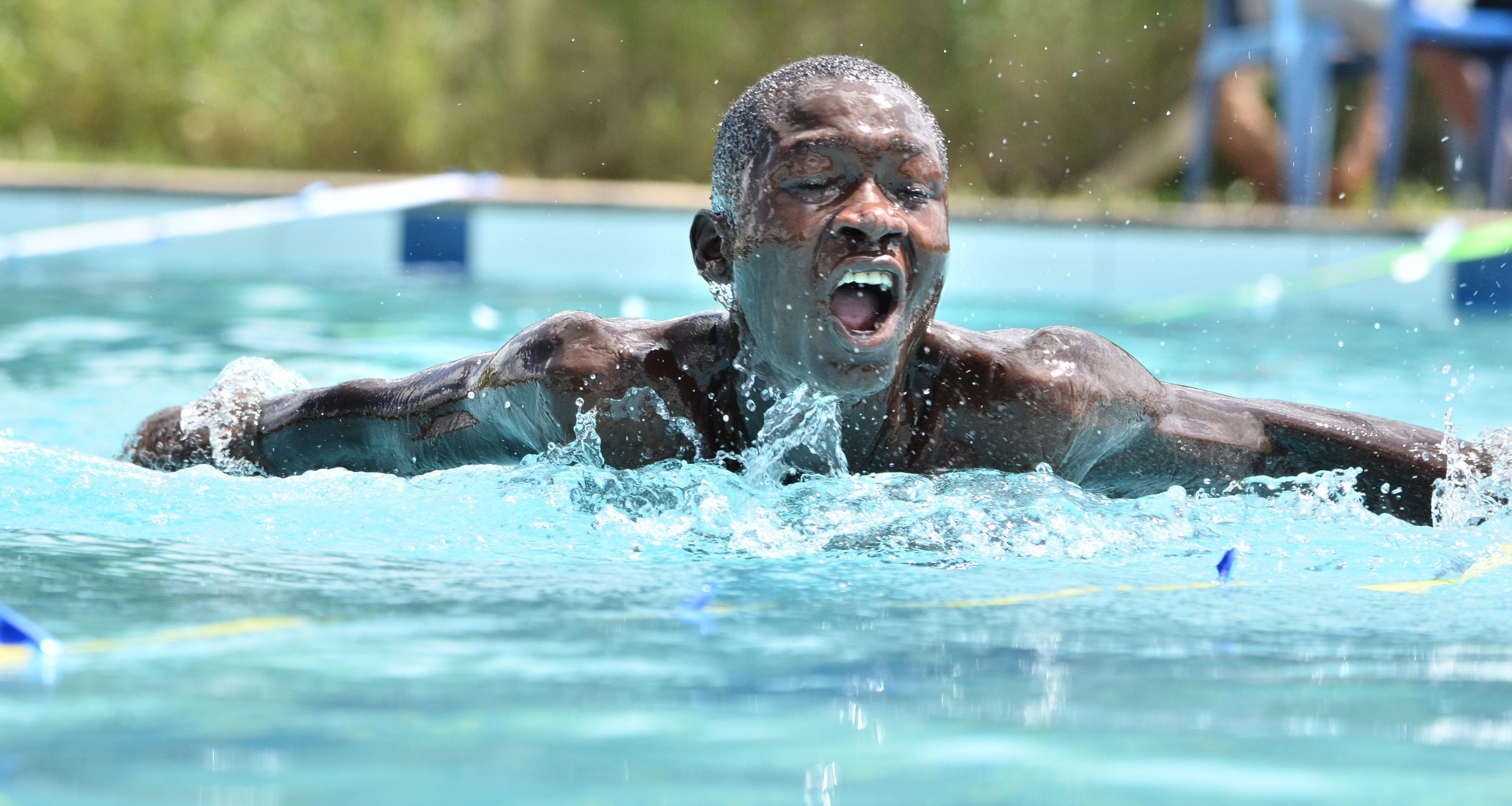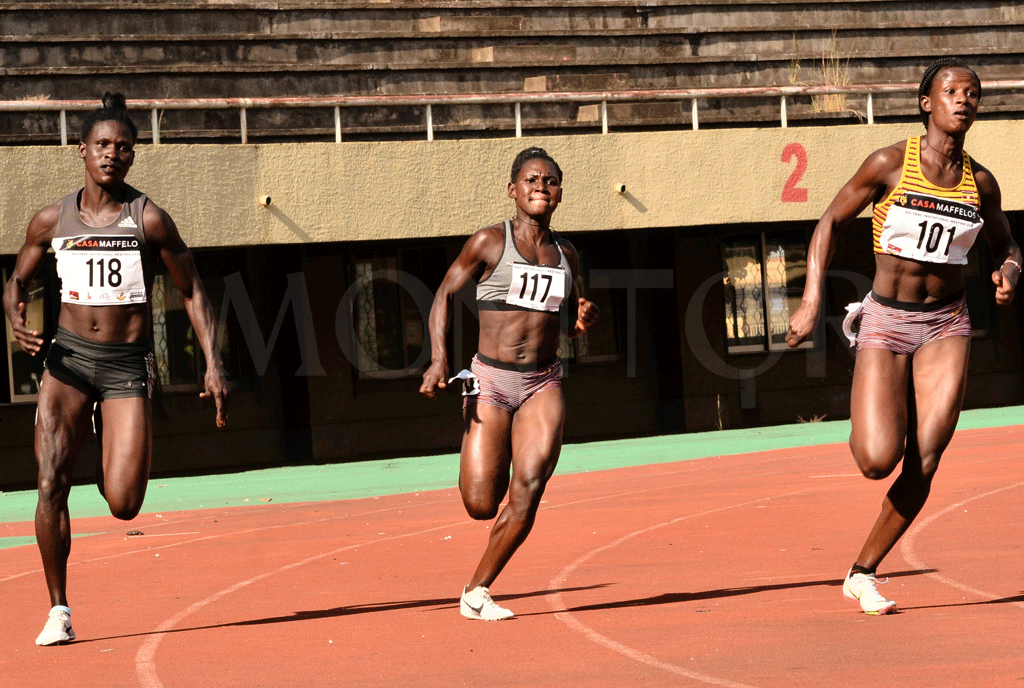Prime
Special Olympics: Sharing sports experience

Inclusion. A special needs athlete competes in swimming during the divisioning games. Inset overleaf is Larry Feni posing with his gold medal at the national games in Gulu. PHOTOS/GEORGE KATONGOLE
What you need to know:
Genevieve Bamwidhukire: "If you have a special needs child, you realise very early on how isolated you are. Some friends may not even invite you for birthday parties. It is so painful to not have these kids involved in anything. Inclusion means different things to many people but for us at Special Olympics, it is about engaging individuals of all abilities."
Wherever Larry Feni Craig goes out in the city, he meets people who know him so well.
Feni, 19, who has had a speech and hearing impairment since he was three years old, is a swimming sensation who was recruited by Silver Fin Swimming Club and has been invited to the national team.
Feni won gold in the 25m breaststroke M04 division and silver in the 50m freestyle M17 at the Special Olympics World Games in Abu Dhabi in 2019.
Swimming has been key to Feni’s popularity, surprising even his mother Gabriella Karungi, who hired a personal coach to encourage her son to shine on.
Feni was part of the 200 people that were on stage to earn places on the 30-man team that will travel to Berlin, Germany for the World Games next June and he effortlessly cleared his races with passion and zeal.
He is a passionate basketball player too, who was enrolled at Hill Preparatory School in Naguru, before Karungi opted for home schooling to allow him enough time to conduct private swimming lessons at Kabira Country Club.
He blends well with other athletes and partners because he has been exposed to unified clubs, teams and events.
Only place
There are many cases of children diagnosed with Down Syndrome, autism or aphasia. Special Olympics is the only place where such people can play.
Ten per cent of Ugandan children below 16 have some form of learning disability. One such condition, aphasia, involves a loss or impairment of the ability to produce and/or comprehend language.

Inclusion. Ibra Magezi and Sonia Ngabirano are accompanied by Alex Wasswa to carry the Flame of Hope. PHOTO/GEORGE KATONGOLE
A person with aphasia may be able to speak but not write, or vice versa, or display any of a wide variety of deficiencies in speech, reading, writing, and comprehension. This is a pervasive problem among Ugandan children – over 230,000 under 16 years of age – which leads to a myriad of challenges for them and their families.
Though naturally occurring, many African cultures consider any form of anomaly in the physical or mental growth of a child a taboo – often leading to victimisation of their mother. The child is stigmatised by peers and is essentially cut off from all social networks – within and outside the family.
“If you have a special needs child, you realise very early on how isolated you are. Some friends may not even invite you for birthday parties. It is so painful to not have these kids involved in anything,” Genevieve Bamwidhukire, director of Special Olympics Uganda, said.
Trying to provide opportunities to a larger population of children, Special Olympics Uganda holds national games. They are aimed at promoting acceptance, respect and dignity for all.
“Inclusion means different things to many people but for us at Special Olympics, it is about engaging individuals of all abilities,” Bamwidhukire said.
The games showcase the power and joy of sports. In Gulu, more than 200 athletes and 50 volunteers gathered at St Joseph’s College Layibi to compete in five sports; unified football, athletics, basketball, swimming and volleyball.
The event takes place only once every year.
Michelle Angels was a volunteer from Germany overseeing swimming. Angels was directly contributing to the success of the national games, giving stage to the limitless talents of young people with intellectual disabilities while promoting the barrier-breaking power of sport to promote inclusion and acceptance.
“It is really important to include everyone in sports activities. It gives an opportunity to have a feeling of being together with a group. Being in Special Olympics gives a nice conclusion to my internship in Uganda,” Angels said.
“What I am taking home is that being together in a team makes you feel good about yourself and other people. It is really fun and I think I will never forget this experience.”
Organising games
Apart from building their own résumé in the process, the volunteers have the opportunity to learn game management while helping with skill refinement and development.
Special Olympics Uganda works with champion schools across the country. Recently, the organisation has secured funding from the German development agency, GIZ to train more coaches in the Athletics for Development (A4D) model to equip special needs teachers with skills that can boost inclusion, boost more women and girls participation and add more children from the communities to the school system through sports.
Ten inclusive schools in Kabarole have been targeted on top of two each in Jinja, Wakiso and Kampala. But for most of the time, these schools and centres are self-funded.
To create a platform for competition, Special Olympics Uganda organises national games to select athletes for the World Games. They currently compete in track and field, swimming, volleyball and football. Basketball will be played this time as a demonstration game.
Agnes Nambasa, 24, has been part of the Unified 7-a-side football team at the World Games in Abu Dhabi.
“It’s cool to meet new people and get into different activities. We just have good vibes all around. We’re like a huge family,” Nambasa, also a volunteer at Special Olympics Uganda, said.
A crucial bond
Aisha Kiiza, a Fufa referee who handles Uganda Premier League and Uganda Cup games joined Special Olympics as a volunteer coach in Fort Portal in 2019.
In the Gulu national games, her eight-man team won seven medals. Kiiza says that such games can be an asset for the people with learning disabilities.
“Most people take these people as useless kids but Special Olympics recognises these children in these sports. The children don’t need to look at themselves as wasted and idle but they can compete in their particular division, which promotes inclusion,” Kiiza, one of the three trained coaches in Fort Portal, said.

Genevieve Bamwidhukire
Fort Portal has just slightly more than 200 people with intellectual disabilities under the programme. Kiiza says that so many more are in their homes. She says that training more coaches in skills to handle these children can encourage more parents to allow their children to mingle.
Jacqueline Kihembo, director of Silent Angels Special Centre in Naalya, has been a volunteer with Special Olympics for 15 years.
She traces her journey in sports and has witnessed firsthand how Special Olympics can fulfill dreams. Citing Sumaya Nalutaaya, who won Uganda the first gold and bronze in the first Pan-African games.
“Sports changed her life and she is happy. Parents think that sport is nothing yet there is a lot we can pick from sports. As a teacher I can use sports as a methodology to teach a child who may not be willing to be in class. For example, I can say bring me five balls, or kick this ball five times. This way, I am teaching a skill and teaching them how to count,” Kihembo says.
In Special Olympics, families members are a crucial connection. Yet this bond is weak in Uganda that some athletes attend events without their coaches.
In most cases, a coach will be in charge of a swimming team, for instance, and a football team. When they play at corresponding times, it becomes an intricate affair. In Gulu, four athletes refused to dive into the swimming pool because their coaches were absent.
Whilst sport brings them together, they need morale from the people they can trust and those that believe in them.
Clare Wavamunno is the head of Hill Preparatory, an inclusive school in Naguru where handicapped children are educated along with kids with no disabilities. She started the school when her daughter was diagnosed at three years with severe learning disabilities.
At Special Olympics Uganda, she is a board member representing families.
“Parent involvement is very crucial in the success of these children’s careers. They are the number one fans of the athletes by giving love, support and encouragement that no one else can. I would encourage parents to come out strongly and support their children,” Wavamunno said.
A special kind of games
Special Olympics gives athletes with intellectual disabilities a purpose. Not just the kids with special needs, but those kids who never felt needed and never felt loved to be part of something.
The national games normally start with athletes carrying the “Flame of Hope.”
As tradition goes, when the “Flame of Hope torch” is lit, it is followed by a “torch run” before the Opening Ceremony.

In Gulu, Sonia Ngabirano, a Primary Two pupil of Hill Preparatory who was diagnosed with Down Syndrome, and Ibra Magezi of Makindye Hill Preparatory, carried the Flame of Hope with help of Alex Wasswa, a special needs teacher at Makindye Hill Parents School.
But these are indeed special games! Whereas in ‘normal’ football games, for instance, there will be a centre referee and assistants, in Special Olympics, the centre referee carries a flag to help point to the place where the ball is supposed to go or be placed.
In unified games, athletes are supported by partners, but in Germany, Uganda will field a traditional football team. Divisioning is a key component of the games as athletes have to be placed in the right category to compete.
“Special Olympics gives everyone a place to be themselves. You don’t have to put on any kind of show for anyone else. You can only be a winner in your division,” Sam Kiggundu, the Special Olympics sports director, said.




